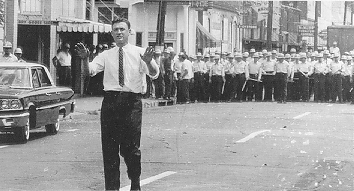Thursday November 20, 2014
John Doar (1921-2014)

Doar in Jackson, Miss., in the summer of 1963.
John Doar died on Veterans Day, Nov. 11. He was a pilot in the U.S. Air Force during World War II but history will remember him—or at least I do—for his service in another war: the war between the states, part II. Or X. Or XXIII. Called “the Civil Rights Movement.”
The New York Times has a good obit here, but the better tribute is Taylor Branch's civil rights tome, “Parting the Waters: American in the King Years: 1954-1963,” which I read in the spring of 1989. A lot of memorable characters in there: Bob Moses, John Lewis, Bayard Rustin ... and John Doar.
He was a kind of Gary Cooper-type hero. He didn't say much, he wasn't flashy, but he had courage and commitment. He called himself a Lincoln Republican. Branch introduced him on page 331:
John Doar was lanky, taciturn, and plainspoken. In 1960, still building a general courthouse law pratice, he counted it as a small step of success that a client paid him to go all the way to California to work on a paternity suit. He was there when Harold Tyler, chief of the Justice Department's Civil Rights Division, tracked him down by telephone.
Attorney General William Rogers had hired Tyler for the express purpose of stepping up the enforcement of the 1957 and 1960 Civil Rights Acts. It was a sign of the times that not a single politically connected Republican, nor any friend of Tyler‘s, expressed interest in the high-ranking position of first assistant in the Civil Rights Division ... [So Doar got the nod.]
Doar arrived in Washington in July 1960 and plunged immediately into the two bureaucratic struggles that would mark his career. The first one pitted legal thinking against political calculations. ... [The second was] a sluggish FBI.
Throughout the early 1960s, Doar prosecuted voting rights cases in the deep South, was a witness to the brutal assault on the freedom riders, including John Lewis and Jim Zwerg, in Montgomery, Ala., in 1961, and was the escort to James Meredith as he tried to register at Ole Miss in 1962 but found his way barred by Gov. H. Ross Barnett.
But the main reason I remember Doar is for an incident that occurred in Mississippi in the summer of 1963.
Medgar Evers was the field secretary there for the NAACP, and in the early morning of June 12, at the end of the Birmingham demonstrations and just hours after Pres. Kennedy’s famous speech in favor of civil rights, Evers was shot and killed outside his home in Jackson. After the funeral, a small segment of the crowd, hundreds of mostly young people, began to take to the streets; they were met by policemen with shotguns.
The temperature was 103 degrees. Some of the Negroes shouted, “We want the killer! We want the killer!” These were the young movement people ... Even on Flag Day, June 14, pairs of them had been arrested off the streets for carrying little American flags, as Jackson's white officials allowed Negroes no public display of any kind. The police ... brought up pumper trucks and dogs, and they charged when some of the young marchers began to throw rocks at them. They had clubbed several and arrested nearly 30 when, suddenly, the man who talked like Gary Cooper appeared in a showdown scene from one of his movies ...
Doar walked into the flashpoint of a riot, hands raised above his head “with bottles and bricks crashing around him.” Shouting his name, he told them this was not the way, and the very sight of him stilled the crowd so that he could be heard. ... “My name is John Doar!” he yelled. “D-O-A-R. I'm in the Justice Department in Washington. And anybody around here knows that I stand for what's right!” He walked forward, calling out the names of Dave Dennis and other movement leaders he knew and how many times they had been arrested, saying they too wanted the crowd to disperse. Miraculously, they did.
Doar would go on to prosecute the federal case against the killers of Goodman, Chaney and Schwerner in 1964, helped draft the Civil Rights Act of 1964, and was tangentially involved in the Selma march in 1965. He was also Chief Counsel for the United States House Committee on the Judiciary during the Watergate scandal. He was awarded the Presidential Medal of Freedom by Pres. Obama in 2012.

Baseball's Active Leaders, 2023
What Trump Said When About COVID
Recent Reviews
Everything Everywhere All at Once (2022)
Black Panther: Wakanda Forever (2022)
Doctor Strange in the Multiverse of Madness (2022)
Spider-Man: No Way Home (2021)
The Cagneys
A Midsummer Night's Dream (1935)
Something to Sing About (1937)
Angels with Dirty Faces (1938)
A Lion Is In the Streets (1953)
Man of a Thousand Faces (1957)
Never Steal Anything Small (1959)
Shake Hands With the Devil (1959)







